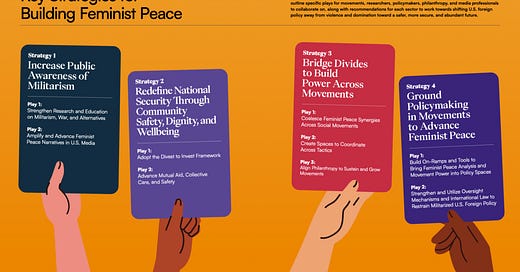Men Wage War, Women Build Peace
War isn't the only tool. The Feminist Peace Playbook lays out alternatives to confrontation.
Happy Juneteenth. Happy Summer! 😎🏖
Donald Trump is weighing his options on the Israel-Iran conflict. Yesterday, he announced he would make a decision in two weeks—a possible indicator he is leaning towards avoiding confrontation.
Avoiding confrontation is at the heart of this week’s column, which I handed over to Kate Alexander. Kate is a Policy & Campaigns Officer at MADRE. MADRE is an international human rights organization focused on gender, racial, climate, and disability justice. It, along with the Grassroots Global Justice Alliance and Women Cross DMZ, form the Feminist Peace Initiative, which in collaboration (there are lots of collaborations…) with the Inclusive Global Leadership Initiative at the University of Denver, recently published the Feminist Peace Playbook. This playbook underscores that there is an alternative to war and militarism. Amen.
It’s part of my effort to bring an alternative lens to what’s happening in the world. If you like this newsletter, please hit 🖤 above —and, please, share with others. If you ❤️ the newsletter, please become a paid subscriber. —Elmira
Israelis and Iranians are caught in a violent spiral, thanks to reckless policymakers who insist that to survive means others must perish. Israel’s strike on Iran’s nuclear sites—carried out despite reports that Tehran was years from a bomb—has led to Iranian retaliation. This tit-for-tat has already killed hundreds in both countries, and the toll keeps climbing.
And larger threats loom: the United States has sent Navy destroyers and an additional aircraft carrier to the region, indicating possible US involvement—especially if Iran harms US interests.
Let us also not forget that Israel has nuclear weapons.
The leaders of all three countries, Trump, Netanyahu, Khamenei, have opted to flex their military muscle, in the name of “national security”—and ignore nuance, planning, or care for people’s actual safety. Collectively, they have decided that war is the only option—three angry old men who not only could, as Simon Tisdall notes, but are willing to get us all killed.
Are there any real leaders we can turn to now? The answer is emphatically: Yes.
They are feminist peace makers.
Currently, there are numerous leaders working in grassroots, feminist peace movements worldwide to put communities’ safety at the heart of policymaking and to hold corrupt officials accountable. These leaders are re-defining national security, not through the whims of ego-driven rulers or the repressive ideologies they serve, but through a deep understanding of what really keeps us safe in our day-to-day lives.
Women human rights defenders have been propelling this redefinition of national security for decades. As an analysis since the end of the Cold War found, when women are able to exercise a strong influence in a peace process, a peace agreement is almost always reached. In 2015, a 20-year study found that women’s participation in peace processes shifts the dynamics of peace talks, increasing the chances of community buy-in and addressing root causes, resulting in improved implementation and durability of peace agreements. That’s likely because when women are at the negotiating table, they can draw from the roles they play as caregivers and grassroots leaders to represent.
Now, the Feminist Peace Playbook, launched earlier this year by the Feminist Peace Initiative and the Inclusive Global Leadership Initiative at the University of Denver, builds on the lessons of global feminist movements and peacebuilders. It offers clear recommendations for US stakeholders to advance foreign policy grounded in feminist principles, including accountability, inclusion, repair, and recognition of root causes. In short, it offers us an off-ramp to these spirals of violence.
Israel justifies its latest strike as a pre-emptive blow against an Iranian nuclear bomb, even though UN inspectors and US intelligence assessed in 2018 that Tehran was still about a year from producing enough fissile material for a single weapon. This week, the International Atomic Energy Agency Director stated that they hadn’t found “any proof” that Iran was pursuing a nuclear weapon. Moreover, by quitting the nuclear deal, the Trump administration destroyed a chance to monitor and prevent Iran's potential bomb development. The Biden team never fixed that mistake. From a feminist peace perspective, a nuclear-free Iran would not only cool today’s crisis but also move the region toward a nuclear-free Middle East, echoing the successful non-proliferation zones in Latin America and Africa.
War is supposed to be an option of last resort. Yet corrupt leaders—Trump, Netanyahu, Khamenei—reach for force first, wielding it at home against protest movements and abroad against political foes to rule through fear.
Some cite Iran’s human rights record to justify airstrikes. Violence won’t fix that. Feminist, women-led movements show that real change comes from grassroots gender-justice campaigns, not bombs. That is what we’ve seen in Sudan, Myanmar, South Korea, and Iran’s Women, Life, and Freedom movement. Each has pushed back on corruption and rights violations, advocating for accountability and justice.
We must remember, there is an alternative. Millions of lives depend on it, few places more urgently than in Palestine. Human rights activists warn that as world attention is on the Israel-Iran war, the Israeli military may ratchet up the violence in the West Bank and especially Gaza. We must continue to bear witness to the genocide in Gaza and war crimes in the West Bank.
We must also rein in our own militarism and expose how war undermines public safety. The US can support that future by passing Representative Delia Ramirez’s (D-Ill) Block the Bombs Act, to limit arms sales to Israel, and Senator Tom Kaine’s (D-VA) the War Powers Resolution to block US direct confrontation with Iran.
On Israel-Iran, there are still opportunities to de-escalate. Iran has publicly advocated for diplomacy and requested. This is the kind of opportunity we need to push policymakers to seize, as people who care about real safety, human rights, peace and democracy.
Safety is intertwined: for Iranians, Israelis, Palestinians and people across the region who crave an end to cycles of grief, radicalization, and vengeance. And that is the safety we urgently need so these three corrupt men don’t kill us all by treating us like pawns in their war games. —Kate
Elsewhere in the World.....
On our radar...
Iran
Now that a conflict with Iran has begun, how could it possibly end? Well, Israel could end its bombing. But that is unlikely. The US could get involved. The jury is out on that. Iran could surrender. Dalia Dassa Kaye says that’s unlikely as well. She doesn’t see many off ramps here. (Just Security)
What are the best and worst case scenarios for the Israel-Iran confrontation? Elise Labott lays them out, including the possible closure of the Strait of Hormuz, Iran’s proxies striking against US citizens and targets, and the rise of oil prices and sparking a recession. (Preamble)
Israel’s conflict with Iran represents far more than another Middle Eastern crisis—it marks the emergence of a dangerous new chapter in nuclear rivalries that has the potential to reshape global proliferation risks for decades to come, writes Farah Jan. (The Conversation)
Changing the subject….
By striking Iran, Netanyahu has diverted European criticism of Israel’s actions in Gaza to support, writes Ksenia Svetlova. (Chatham House)
Suzy Hansen has a cover story about how Israel, with the help of the US, broke not only Gaza but the foundations of humanitarian law. (New York Magazine)
G7
Call it the G6 plus one. Donald Trump left the G7 meeting in Canada a day early, supposedly to deal with Israel’s strike on Iran. That wasn’t a terrible loss, writes Sara Miller Llana. Under Canada’s leadership, the group put out a communique and made progress on a number of issues. They also had Zelensky take Trump’s seat. (Christian Science Monitor)
NATO Summit
What a time to hold a NATO summit. But that’s what NATO members will do in the Hague next week. Given how out of step the US is with NATO’s European members, the agenda is short—focused on defense spending. Sophie Roehse and James Goldgeier lay out other things to watch out for next week, including Ukraine. (Brookings)
US
Two Minnesota lawmakers were shot last Saturday, in a brazen act of political violence. Nina Jankowicz, an Interruptrr fellow and friend, is someone who has been threatened for serving in government. She writes about the need for politicians to remember they are in service and refrain from politicizing violence—especially in light of Utah Senator Mike Lee’s disgusting posts on Saturday. (Wiczipedia)
Africa
There seems to be peace in at least one global conflict… Rwanda and Congo are set to sign a peace agreement in Washington next Friday, June 27, ending the conflict in Eastern Congo. Mahima Kapoor and Louis Oelofse report. (DW)
A reminder that while we’re all focused on Israel and Iran, Sudan’s brutal civil war continues—and the Sudanese face famine.
The same is true for South Sudan, whose population also faces “catastrophic levels of food insecurity.” “This is not a human catastrophe,” writes Nyagoah Tut Pur. “It’s a human rights crisis.” (Human Rights Watch)
Asia
Drama in Thailand.. After a call between the country’s young female prime minister (38) and Cambodia’s 72- strongman was leaked. Thai Prime Minister Paetongtam called Cambogian strongman Hun Sen “uncle” and criticized her own army following border clashes last month. Helen Regan and Kocha Olarn report on the controversy, in which there are calls for Paetongtam’s resignation. (CNN)
I point out the PM’s age and gender, because no doubt that factored into her behavior. Younger and a woman, she is expected to show more deference to the older man—even if she is the leader of a country.
By cozying up to Russia’s Putin, perhaps Donald Trump is trying to put a wedge between China and Russia. Natalia Chabarovskaya says that China and Russia’s ties are deep and might not easily be upended. (CEPA)
When the Taliban recaptured power in Afghanistan, human rights defenders took a big hit. Many fled the country or went underground. Operating in the shadows, they’re persisting, but under precarious conditions, writes Rachel Reid. (Afghan Analyst Network)
The Americas
A passing of note… Violeta Chamorro, Nicaragua’s president in the 1990s, the first woman to lead a Central American country, has died. She played a key role in working to unify the country, after Nicaragua’s civil strife in the 1980s, between the leftist Sandinistas and the strongman rule of Anastasio Somoza. She was 95.
Under the Radar
In the UK, MI6, the country’s spy agency, has a new boss, Blaise Metreweli. She’s the first woman to hold the post. She may now be “M” but she was for a long time “Q” writes Harriet Marsden. (The Week) IYKY
Opportunities
Interruptrr is hiring! I’m looking for journalism or international relations majors to help me put together special sections for the newsletter. More info here.
The Council of Americas is on the hunt for a Vice President.
UNESCO’s Youth for Peace intercultural leadership program is taking applications until June 22.
The Clinton Foundation is looking for a Senior Manager, Women and Girls’ Equality - for a six month contract.
Editorial Team
Elmira Bayrasli - Editor-in-Chief







